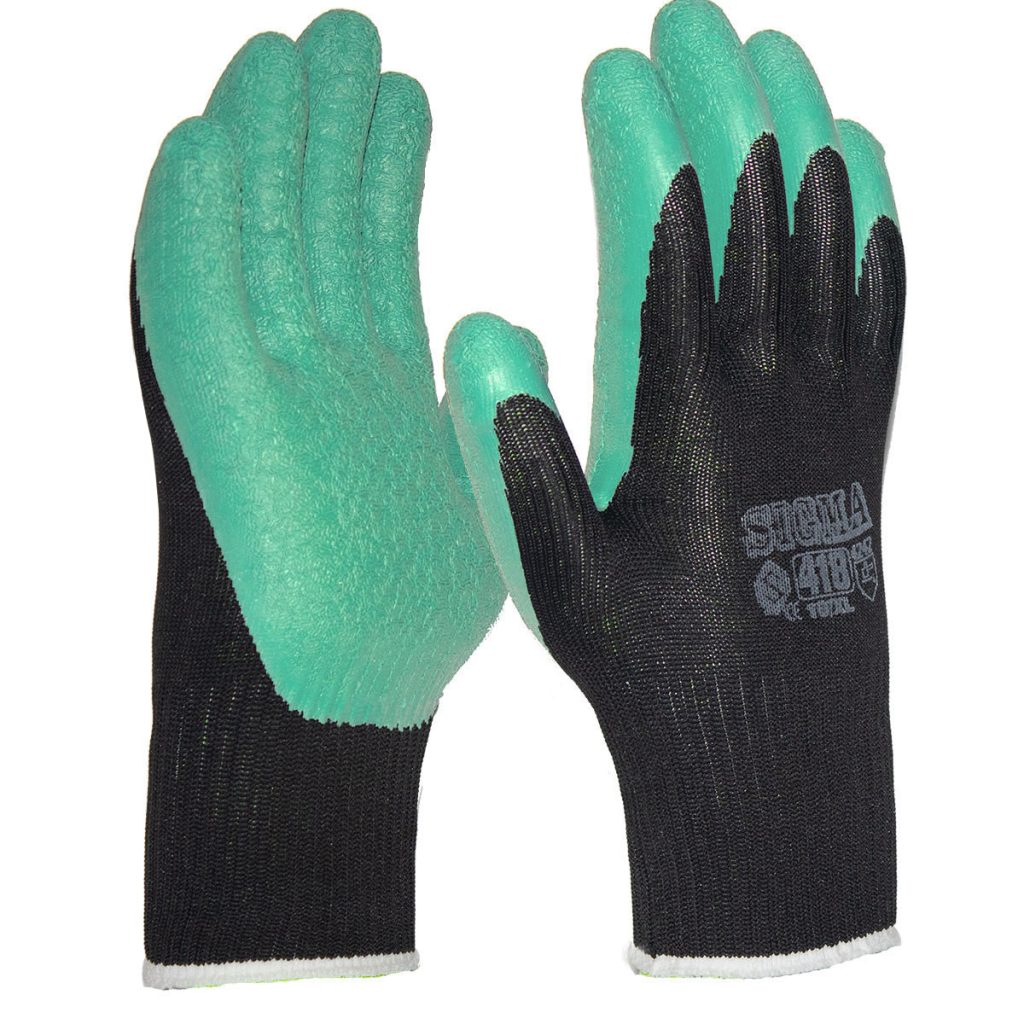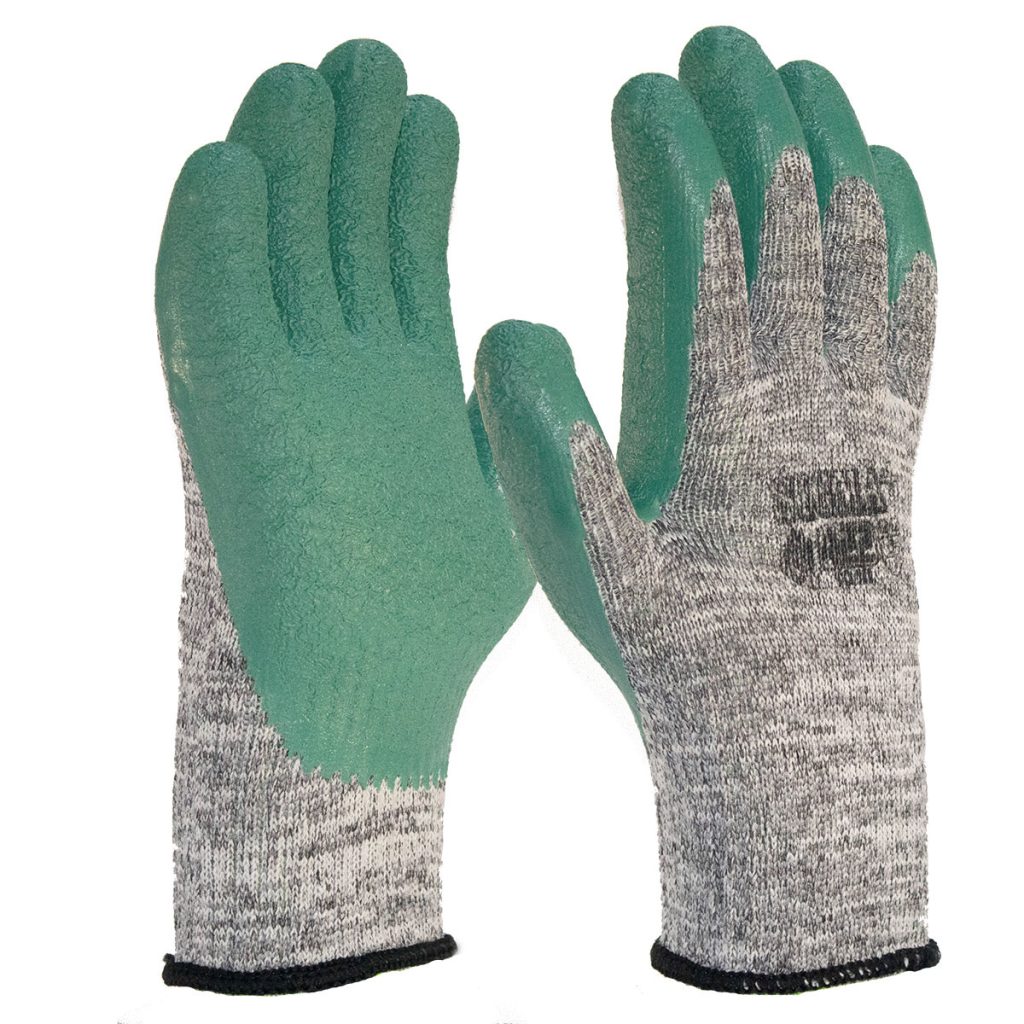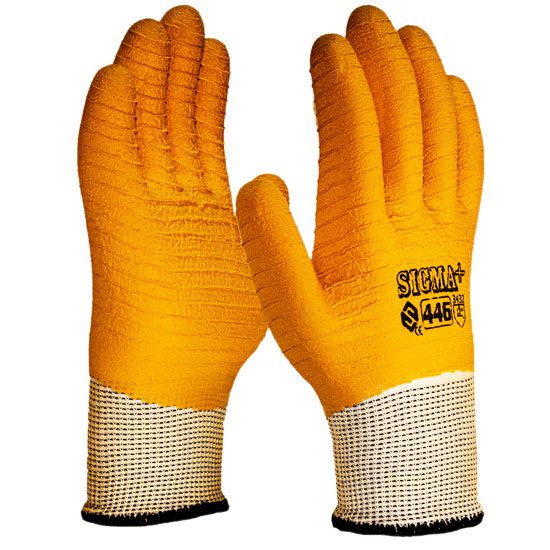Tilling Gloves
Tiling Work Gloves

When it comes to tiling work gloves, there are a few factors to consider to ensure that you choose the right gloves for the job. Here are some things to keep in mind:
1. Material: Tiling work gloves can be made from a variety of materials, including leather, synthetic materials like neoprene or nylon, or a combination of both. Leather gloves are durable and provide good grip, but may not be as flexible as synthetic gloves. Neoprene and nylon gloves are lightweight and flexible, but may not be as durable as leather.
2. Grip: A good pair of tiling work gloves should provide a good grip to prevent slipping or dropping tiles. Look for gloves with textured or rubberized palms and fingers to help you hold onto tiles securely.
3. Comfort: You’ll likely be wearing your tiling work gloves for extended periods of time, so comfort is important. Look for gloves with a comfortable fit and good breathability to prevent sweating and discomfort.
4. Protection: Tiling work gloves should provide protection against cuts, scrapes, and other injuries that can occur when handling tiles. Look for gloves with reinforced fingertips and palms, and consider gloves with additional padding or protection for your knuckles and wrists.
5. Size: It’s important to choose gloves that fit properly to ensure maximum protection and comfort. Make sure to measure your hand and refer to the manufacturer’s sizing chart to choose the right size.
Overall, a good pair of tiling work gloves will provide acombination of grip, comfort, and protection to help you handle tiles safely and efficiently. Consider your specific needs and preferences when choosing gloves, and don’t be afraid to try on a few different options to find the best fit. Always prioritize safety when working with tiles, and make sure to wear appropriate gloves and other protective gear as needed.
What Gloves to Use for Tiling?
When it comes to tiling, there are several types of gloves that can be used to protect your hands and make the job easier. Here are some options to consider:
1. Latex coated gloves:Latex coated gloves can be a good option for tiling work, particularly for tasks that involve handling tiles or using grout.
2. Disposable gloves: Disposable gloves can be a great option for tiling jobs, particularly for tasks that involve using caulk or grout. They are typically made of latex or nitrile and are designed to be worn once and then discarded. Disposable gloves are affordable and easy to use, but may not provide the same level of protection as more heavy-duty gloves.
3. Leather gloves: Leather gloves are a durable option that can offer good protection against cuts and scrapes. They are typically made of cowhide or goatskin and are designed to be flexible and comfortable while allowing for good grip. Leather gloves are a good choice for handling tiles and other materials, but may not be as suitable for tasks that involve using chemicals or adhesives.
4. Neoprene gloves: Neoprene gloves are a synthetic option that are lightweight and flexible, making them a good choice for tasks that require dexterity. They offer good protection against water and chemicals and can be a good choice for tiling jobs that involve using adhesives and grouts.
5. Nitrile gloves: Nitrile gloves are another synthetic option that are designed to be durable and resistant to chemicals, making them a good choice for tiling jobs that involve using adhesives and grouts. They are also resistant to punctures and tears,making them a good choice for handling sharp tiles and tools.
6. Vinyl gloves: Vinyl gloves are a low-cost option that can be used for light-duty tasks like handling tiles and mixing grout. They are comfortable to wear and offer basic protection against dirt and grime, but may not be as durable as other types of gloves.
When choosing gloves for tiling, it’s important to consider the specific tasks you’ll be performing and the level of protection you need. Make sure to choose gloves that fit properly and allow for good dexterity, and always prioritize safety when handling tiles and other materials.
Latex Coated Gloves for Tiling
Latex coated gloves can be a good option for tiling work, particularly for tasks that involve handling tiles or using grout. Here are some of the benefits of using latex coated gloves for tiling:
- Good grip: The latex coating on these gloves provides good grip, which can help you handle tiles more securely. This can be especially important when working with larger or heavier tiles that require some extra strength to lift and maneuver.
- Flexibility: Latex coated gloves are typically made of a flexible material, which can allow for good dexterity and flexibility. This can be particularly important when working in tight spaces or performing tasks that require a lot of precision.
- Durability: Latex coated gloves are generally quite durable, which can make them a good choice for tiling work. They can provide protection against cuts, scrapes, and other injuries that can occur when handling tiles.
- Comfort: Latex coated gloves are typically quite comfortable to wear, and can be a good choice for extended periods of use. They are also lightweight and breathable, which can help prevent sweating and discomfort.
- Affordable: Latex coated gloves are typically quite affordable, which can be a big advantage when working on a tight budget. They can be purchased in bulk and are often available at hardware stores and online retailers.
- Overall, latex coated gloves can be a good choice for tiling work, particularly for tasks that involve handling tiles or using grout. Make sure to choose gloves that fit properlyand allow for good dexterity, and always prioritize safety when handling tiles and other materials. Additionally, it’s important to note that some people may be allergic to latex, so so if you or anyone on your team has a latex allergy, it’s important to choose an alternative type of glove.
How Do I Protect My Hands When Tilling?
Protecting your hands is an important part of tiling work, as it involves handling sharp and heavy tiles, using potentially harsh chemicals, and using tools that can cause injury if not handled properly. Here are some ways you can protect your hands when tiling:
- Wear gloves: Wearing gloves is one of the most important things you can do to protect your hands while tiling. As mentioned earlier, there are several types of gloves that can be used for tiling, including disposable gloves, leather gloves, neoprene gloves, nitrile gloves, and vinyl gloves. Make sure to choose gloves that fit properly and offer the appropriate level of protection for the tasks you’ll be performing.
- Use hand tools: When handling tiles, it’s important to use hand tools like suction cups, tile nippers, and tile cutters to avoid directly handling the tiles with your bare hands. This can help prevent cuts and scrapes, as well as provide more control over the tiles during installation.
- Wear safety glasses: Safety glasses are an important part of protecting your hands, as they can help prevent debris and tile chips from getting in your eyes. This can help you avoid distractions and keep your focus on handling the tiles and tools safely.
- Use chemical-resistant gloves: When working with adhesives or grouts, it’s important to wear gloves that are specifically designed to be resistant to the chemicals you’ll be using. This can help protect your hands from irritation, burns,or other injuries that can result from exposure to these chemicals.
- Take breaks: Tiling can be a physically demanding job, and taking regular breaks can help prevent fatigue and reduce the risk of injury. Make sure to take frequent breaks to rest your hands and stretch your muscles.
- Stay hydrated: Drinking plenty of water is important for keeping your hands and body hydrated, which can help prevent cramps and fatigue. Make sure to drink plenty of water throughout the day, especially if you’re working in a hot or humid environment.
- By taking these steps, you can help protect your hands while tiling and reduce the risk of injury. Remember to always prioritize safety, and don’t hesitate to ask for help or seek medical attention if you experience any pain or discomfort while working.




